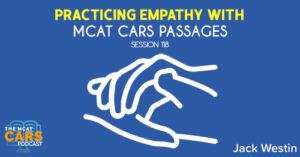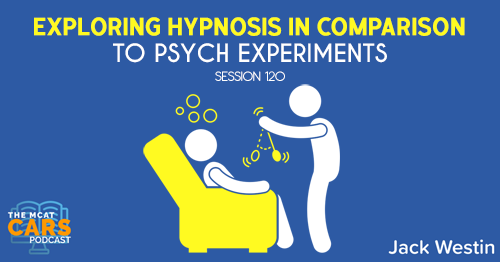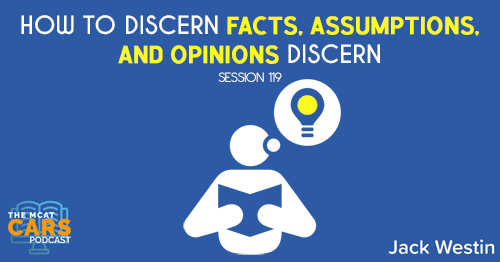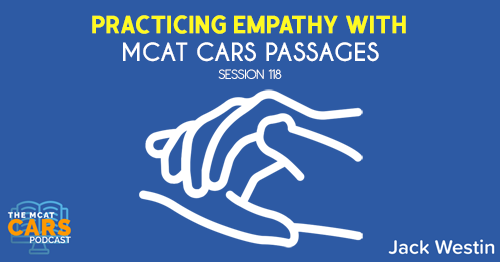Apple Podcast | Google Podcast
Session 118
In this episode, Jack and I discuss how to find article passages that are similar to MCAT CARS passages.
As always, I’m joined by Jack Westin from JackWestin.com. Check out all their amazing free resources including a free trial session of Jack’s full course to see how it’s like learning from Jack Westin himself.
Listen to this podcast episode with the player above, or keep reading for the highlights and takeaway points.
Link to the article:
https://www.theguardian.com/environment/commentisfree/2020/oct/28
The scientific community has long been unequivocal about biodiversity destruction. Last month, the UN reported that the world had failed to meet fully any of the 2020 Aichi biodiversity targets that countries agreed with fanfare in 2010, even as it found that biodiversity is declining at an unprecedented rate, and the pressures driving this decline are intensifying.
This week’s Bankrolling Extinction report finds that financial institutions provide the capital that is funding over-exploitation of our lands and seas, putting biodiversity in freefall. Last year, the world’s 50 biggest banks provided $2.6tn (£1.9tn) in loans and other credit to sectors with a high impact on biodiversity, such as forestry and agriculture. Bank by bank, the report authors found a cavalier ignorance of – or indifference to – the implications, with the vast majority unaware of their impact on biodiversity.
Fortunately, signs are emerging that some governments are – slowly – taking aim at financial backers of the destruction of the natural world. They must now push more forcefully. In the wake of Covid-19, treasury cupboards may be bare, but with new policies and limited recovery funds, they can steer trillions of dollars of private capital towards a nature-positive response to coronavirus, to spur growth, prosperity and resilience without returning to business as usual over-consumption and climate and biodiversity risk.
Voices from economics and finance are starting to add impetus and rationale for such momentum. One of the world’s foremost business groups, the World Economic Forum (WEF), has recognised the economic importance of nature. In its annual Global Risks Report, published earlier this year, WEF found that for the first time environmental risks dominated perceived business threats. Biodiversity loss was considered among the five most impactful and most likely risks in the next decade, with concerns ranging from the potential collapse of food and health systems to the disruption of entire supply chains.
[02:09] Where to Find Articles
Jack says to look for things based on opinion. It’s hard for students to understand simply because we’re all trained and wired to read and study whatever your professor puts in front of you. You’re going to be tested on it, so you assume that it’s a fact. So it’s hard to notice when you’re dealing with a conversational piece, an article that is merely just someone’s opinion.
'CARS likes to cater towards passages where you have to think about whether or not the person writing it is basing it off facts, basing it off evidence.'Click To TweetThe best place to go is anywhere that allows for essays and opinions. And one of the websites that I recommend is aldaily.com. Check out the opinions essay section, and you’ll get a lot of great articles like the ones that we provide students.
[04:09] Paragraph 1, Sentence 1
The scientific community has long been unequivocal about biodiversity destruction.
Jack says:
You could probably biodiversity destruction as the Amazon rainforest. If you can look at it from the lens that the author is trying to paint, then you’re going to understand the rest of the passage a lot faster. If you’re willing to listen to this author, then give your time early on because it’s going to help you as you keep reading.
So if you can visualize and sense what biodiversity means to this person, you can manipulate that in your mind as you keep reading. You can adjust and modify and morph whatever your visualization of it is.
'Reading is a form of empathy. You're having empathy for whoever you're listening to or whoever you're reading from.'Click To TweetAnd one of the skills that a great physician has is the ability to listen to anyone no matter what background they’re from. So if you can listen to this person, even though their topic is probably not something you’re interested in or familiar with, then it shows you probably have a lot going for you when you go into medicine.
[07:27] Paragraph 1, Sentence 2
Last month, the UN reported that the world had failed to meet fully any of the 2020 Aichi biodiversity targets that countries agreed with fanfare in 2010, even as it found that biodiversity is declining at an unprecedented rate, and the pressures driving this decline are intensifying.
Jack says:
It’s consistent with the previous sentence, but it does bring in a new element. It’s not just saying that biodiversity destruction is happening, and everyone agrees with it. It’s actually talking about how, at some point, maybe they’re not doing their job or they’re finding that it’s actually getting worse.
[08:32] Paragraph 2, Sentence 1
This week’s Bankrolling Extinction report finds that financial institutions provide the capital that is funding over-exploitation of our lands and seas, putting biodiversity in freefall.
Jack says:
The report is finding that financial institutions are the ones funding all of this. And that’s hard to understand, especially if you don’t have a financial background. You’re probably thinking about how banks have anything to do with biodiversity destruction. How can we blame them?
The companies that want to reuse the resources of land probably have to invest in tractors and all the different technologies required to basically destroy the land. And now, the author is pointing fingers at the bank. If the bank doesn’t provide the funds to these companies, then these companies can’t do their job.
[09:49] Paragraph 2, Sentence 2
Last year, the world’s 50 biggest banks provided $2.6tn (£1.9tn) in loans and other credit to sectors with a high impact on biodiversity, such as forestry and agriculture.
Jack says:
Now, it’s giving you specifics – forestry, agriculture, everything that we would expect with biodiversity.
[10:24] Paragraph 2, Sentence 3
Bank by bank, the report authors found a cavalier ignorance of – or indifference to – the implications, with the vast majority unaware of their impact on biodiversity.
Jack says:
Just more discussion about these financial institutions not caring about the impact on the biodiversity of our planet.
This is an opinion. Maybe the banks do care, maybe they shouldn’t be blamed. And maybe not every bank is the same. And you don’t need to know what the word “cavalier” means. As long as you notice that they are saying they’re ignorant and indifferent. Then you get the vibe.
“This is not about how strong your vocabulary is. You just need to be able to read for the context.”Click To TweetThere’s no single word in the whole sentence that will make or break you. It’s a bunch of words. So stick to it. Hang in there. Read it. Don’t give up too soon. And you’re going to figure it out.
[11:41] Paragraph 3, Sentence 1
Fortunately, signs are emerging that some governments are – slowly – taking aim at financial backers of the destruction of the natural world.
Jack says:
The governments are now looking at doing something to these banks that are financing this destruction. This is a very important assumption. They didn’t say anything. They just said governments are intervening. But what does that mean for us? It assumes that governments care about biodiversity and they’re trying to protect it.
Another strong assumption we can make is that the government is not the financial backer and they are against the financial backers. And the fact that the government can intervene means they’re stronger. They have more power and authority. That’s not stated at all. But that’s assumed knowledge here.
The author can’t suggest that governments are taking aim if the governments do not have more power than the financial institutions. And that’s really hard for students to wrap their heads around because it’s easy to miss and overlook.
And we can pick up on those assumptions if we read carefully. It’s not outside knowledge because the way they say it suggests so. The MCAT wants to see if you can find the most obvious assumptions. So in this case, that’s probably a strong assumption that the MCAT could ask and the answer may seem out of scope when they say the government has more authority or more power than the banks. And it might seem like it’s not in the passage, but it’s there. It’s just not obvious enough unless you’re reading carefully.
[15:05] Paragraph 3, Sentence 2
They must now push more forcefully.
Jack says:
It’s just a quick little follow-up to the government’s taking aim and now needing to push more forcefully because maybe they were doing something previously and it wasn’t working.
[15:21] Paragraph 3, Sentence 3
In the wake of Covid-19, treasury cupboards may be bare, but with new policies and limited recovery funds, they can steer trillions of dollars of private capital towards a nature-positive response to coronavirus, to spur growth, prosperity and resilience without returning to business as usual over-consumption and climate and biodiversity risk.
Jack says:
Now, we have a little COVID-19 take on this. And that because of COVID-19, lots of money was gone. But with new policies and funds, they have lots of money to do at their disposal.
[16:16] Paragraph 4, Sentence 1
Voices from economics and finance are starting to add impetus and rationale for such momentum.
Jack says:
All we know is that maybe people from the finance world, the same world the banks are from, may actually start turning to some extent. We don’t know if it’s everyone, we don’t know who exactly is involved because it’s a very broad term.
So this is confusing because, at one point, we’re suggesting that the banks are hurting biodiversity. And now we’ve shifted to how there are people that actually want to help.
There are people from all groups that have different opinions and even within the same groups. So it’s okay to look at it that way. And that’s being flexible, being open-minded, and realizing that not everyone’s exactly the same or has the exact same opinions.
[17:59] Paragraph 4, Sentence 2
One of the world’s foremost business groups, the World Economic Forum (WEF), has recognised the economic importance of nature.
Jack says:
We have a new name here and they are saying that nature has this economic importance.
[18:29] Paragraph 4, Sentence 3
In its annual Global Risks Report, published earlier this year, WEF found that for the first time environmental risks dominated perceived business threats.
Jack says:
The group is saying that these environmental issues are potentially going to hurt businesses. So now we know the rationale is actually economics-based. It’s all money. You could have assumed that in the first sentence. But now they directly suggest it. And it shows how selfish they are. They want to destroy the environment to make money and now they’re keeping the environment to make money.
[19:22] Paragraph 4, Sentence 4
Biodiversity loss was considered among the five most impactful and most likely risks in the next decade, with concerns ranging from the potential collapse of food and health systems to the disruption of entire supply chains.
Jack says:
The author is expanding on what those threats are – the collapse of food and health systems.
[19:49] Main Idea
The banks are hurting biodiversity. But then later we have governments and even other people from the economic world, probably not banks, but other organizations like this WEF, that are actually trying to shift this.
So in the broad sense of the word economic and finance, it seems like there is a difference between the banks and these other groups. These business groups don’t really suggest the banks are shifting gears, but that’s fine. We can have a distinction even within the same group.
The biggest takeaway here is the first sentence of the third paragraph – “Fortunately, signs are emerging that some governments are – slowly – taking aim at financial backers of the destruction of the natural world.”
And this is a good exercise for students as they’re reading what else can they take away from the sentence that maybe doesn’t appear to be at face value? That’s exactly what an assumption is. You’re assuming things based on what’s being said and at face value. It seems like it’s using outside knowledge, but it’s really not.
Links:
Link to the article:
https://www.theguardian.com/environment/commentisfree/2020/oct/28
SEARCH SITE
SEARCH SITE
LISTEN FOR FREE












